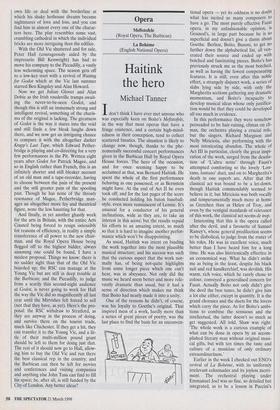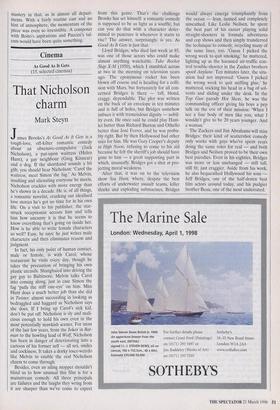Ope ra
Mefistofele (Royal Opera, The Barbican) La Boheme (English National Opera)
Haitink the hero
Michael Tanner
Idon't think I have ever met anyone who was especially keen on Boito's Mefistofele, in the way that most operas that have a fringe existence, and a certain high-mind- edness in their conception, tend to collect scattered fanatics. The situation is likely to change now, though, thanks to the phe- nomenally successful concert performances given in the Barbican Hall by Royal Opera House forces. The hero of the occasion, and for once seeming happy to be acclaimed as that, was Bernard Haitink. He spent the whole of the first performance behaving as one possessed, or as Bernstein might have. At the end of Act II he even took off; and for the last pages of the score he conducted holding his baton baseball- style, even more reminiscent of Lennie. It's unusual for a conductor of his general inclinations, wide as they are, to take an interest in this score; but the results repaid his efforts to an amazing extent, so much so that it is hard to imagine another perfor- mance which won't be disappointing.
As usual, Haitink was intent on binding the work together into the most plausible musical structure; and his success was such that the curious aspect that the work nor- mally has, of being not-quite highlights from some longer piece which one can't hear, was in abeyance. Not only did the music we heard seem better and more rele- vantly dramatic than usual, but it had a sense of direction which makes me think that Boito had nearly made it into a unity.
One of the reasons he didn't, of course, was his loyalty to Goethe's original. That inspired mess of a work, hardly more than a series of great pieces of poetry, was the last place to find the basis for an unconven- tional opera — yet its oddness is no doubt what has incited so many composers to have a go. The most purely effective Faust opera, in my unfashionable opinion, is Gounod's, in large part because he is so superficial and doesn't give a damn about Goethe. Berlioz, Boito, Busoni, to get no further down the alphabetical list, all ven- erated their source and ended up with botched and fascinating pieces. Boito's has previously struck me as the most botched, as well as having the fewest compensating features. It is still, even after this noble effort, a strangely disjunct work, a series of slabs lying side by side, with only the Margherita sections gathering any dramatic momentum, and Boito's incapacity to develop musical ideas whose only justifica- tion would be that they could be developed all too much in evidence.
In this performance they were somehow persuaded to be hair-raising, climax on cli- max, the orchestra playing a crucial role, but the singers, Richard Margison and Nelly Miricioiu, also performing with the most intoxicating abandon. The whole of Act III in particular, clearly the great inspi- ration of the work, surged from the desola- tion of `L'altra notte' through Faust's attempted comforting to the lovely 'Lon- tano, lontano' duet, and on to Margherita's death in one superb arc. After that the classical act was bound to be a let-down, though Haitink commendably seemed to believe in it; but Miricioiu was both vocally and temperamentally much more at home as Gretchen than as Helen of Troy, and even by the vestigial standards of relevance of this work, the classical act seems de trop.
Interesting that this is the opera called after the devil, and a favourite of Samuel Ramey's, whose general predilection seems to be diabolical, to judge from the roster of his roles. He was in excellent voice, much better than I have heard him for a long time. He was also histrionically effective in an economical way. What he didn't strike me as being in the least, despite his black suit and red handkerchief, was devilish. His warm, rich voice, which he rarely chose to colour, conveyed a generalised concern for Faust. Actually Boito not only didn't give the devil the best tunes, he didn't give him a lot else either, except in quantity. It is the grand choruses and the duets for the lovers which carry the piece. As for Boito's ambi- tions to combine the sensuous and the intellectual, the latter doesn't so much as get suggested. All told, Shaw was right: `The whole work is a curious example of what can be done in opera by an accom- plished literary man without original musi- cal gifts, but with ten times the taste and culture of a musician of only ordinary extraordinariness.'
Earlier in the week I checked out ENO's revival of La Boheme, with its uniformly irrelevant colonnades and its joyless merri- ment. The orchestral playing under Emmanuel Joel was so fine, so detailed but integrated, as to be a lesson in Puccini's mastery in that, as in almost all depart- ments. With a fairly routine cast and no hint of atmosphere, the momentum of the piece was even so irresistible. A composer with Boito's aspirations and Puccini's tal- ents would have been quite something.





































































 Previous page
Previous page